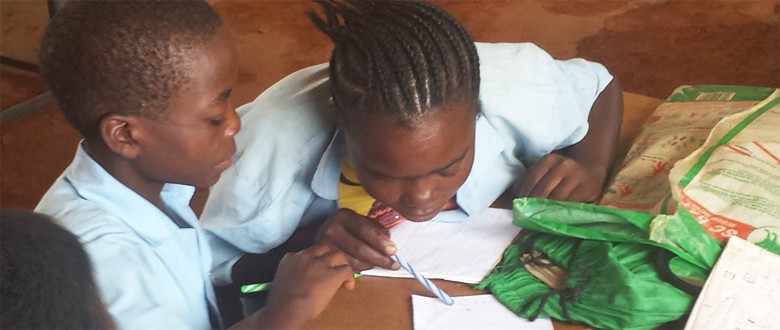
VVOB’s ECSITE project in Zambia ran from January 2013 to December 2015 and was aimed at improving the quality of teaching and learning in community schools for the benefit of Zambia’s most vulnerable children. Co-funded by the European Union (EU) and Belgium, the project was implemented in close partnership with Zambia Open Community Schools (ZOCS) and the Ministry of Education, Science, Vocational Training and Early Education (MESVTEE). The project has been very positively reviewed by a Results-Oriented Monitoring (ROM) of the EU as well as by an external evaluation and found to be relevant, effective and efficient. In this article, we share some of the conclusions and lessons learned from these evaluations.
Addressing the needs of vulnerable children
According to the evaluations, the ECSITE project responded positively to the needs of the target groups: untrained community school teachers and Parent Community School Committees in 250 community schools in Central Province and Copperbelt Province. These needs were related to training and instructional materials, infrastructure, performance and progression rates, opportunities for learners with special needs and for girls and leadership aspects of community schools. Strategies such as capacity development of Teacher Resource Centres, advocacy, training of Parent Community School Communities on topics such as operational guidelines for community schools and targeting of rural beneficiaries were all found to be appropriate approaches. By responding to the identified needs of community schools, the project appropriately and effectively addressed poor and underserved children.
Improvements in teaching and learning
ECSITE’s emphasis on imparting pedagogical skills, resource material support and improved school leadership brought significant improvements in the quality of teaching and learning in community schools. Project monitoring information shows that the impact of the pedagogical training on teaching quality was tremendous. The external evaluation concluded that the project led to enhanced performance in teaching and learning in the targeted schools. One of the success factors identified was that the provision of teaching and learning materials to Teacher Resource Centres and community schools was always accompanied by appropriate capacity development of teachers on how to access and use these materials.
In addition to improvements in teaching and learning, the external evaluation identified the following impacts of the project: increased awareness about the entitlements for community schools, the inclusion of community schools in capacity development by the Ministry, increased enrolment and high pass rates in community schools targeted by ECSITE, and children with special educational needs and girls increasingly being recognised by teachers as having special requirements.
Effective partnerships
The model of cooperative implementation between VVOB and ZOCS was found to be very effective. It involved joint working at all levels, from national policy to Provincial, District and Zonal up to the school and community level with clearly defined responsibilities which complemented each other in advocacy, capacity development and service delivery. Media, communication and monitoring activities were carried out together. The partnership between VVOB and ZOCS allowed the project to draw on existing expertise and networks. The ROM of the EU concluded that this cooperation model has potential for replication in other projects. VVOB and ZOCS have already extended their partnership in a new project entitled ‘Quality Early Education in Community Schools’ which is also being co-funded by the European Union and Belgium.
In terms of sustainability, the participation of different stakeholders in the ECSITE project has also opened the door for community school participation in various Ministry trainings.
In conclusion, the evaluations show that the ECSITE project has led to relevant teaching and learning improvements in 250 community schools in Zambia. If you would like to see how this project worked in practice, you can watch this short documentary which illustrates the challenges faced by community schools in Zambia and showcases some of the interventions of the ECSITE project. You can also read a testimony of one of the teachers here.
(Angela Mulemena, Zonal In-Service Coordinator, Ndola)




